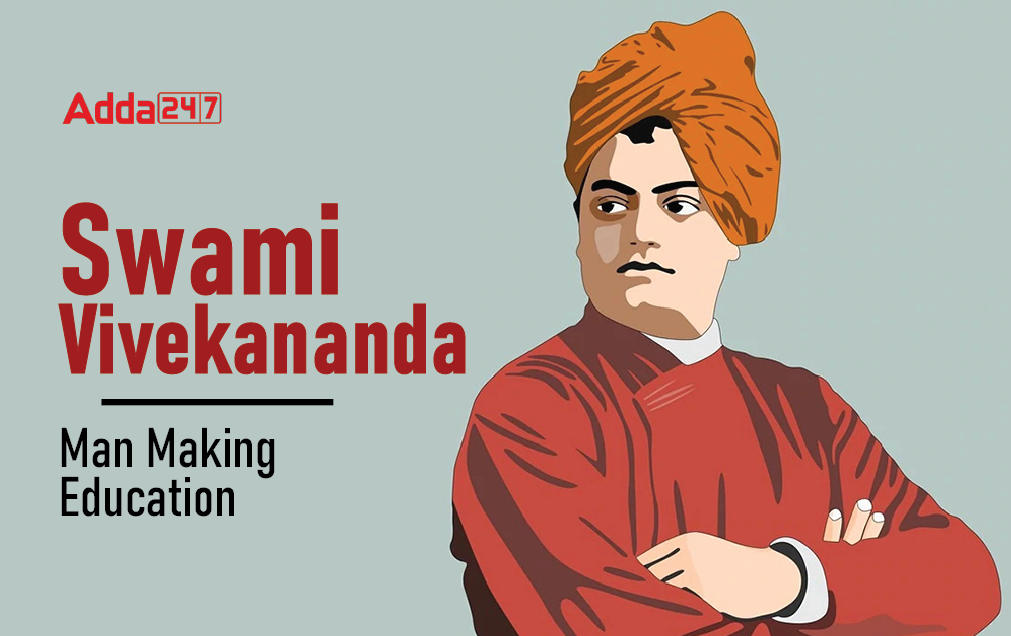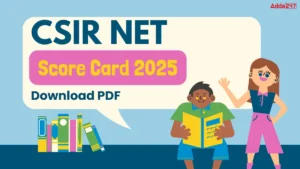Table of Contents
Swami Vivekananda mainly emphasized on Man making education. Man making means development of a child in respect to their emotionally, morality, humanity, character, physically, health etc. Here we are going to learn Swami Vivekananda – Man Making Education in details with education development, philosophy, curriculum.
Swami Vivekananda (Man Making Education)/
स्वामी विवेकानंद (मनुष्य निर्माण शिक्षा)
Life sketch : –
Swami Vivekananda was born in 1863 in a Kshatriya family of Calcutta. Before he became a monk, his name was Narendra Nath Datta. While he was a student in college at seventeen years of age, he came under the influence of Sri Ramakrishna Parmahansa. Narendra Nath was an earnest student of philosophy and poetry. He studied all the systems of western philosophy.
He urged for the uplift of the masses and wanted to make them strong and self dependant. As he had sympathy for the poor, he was a fore runner of Mahatma Gandhi. He pleaded for social reform in India and for religious freedom in the west. Till his death in 1902, he repeatedly asserted that Indians had become weak and poor because they did not apply their Vedanta to life. He asserted that India needs strength – giving religion and a man – making education.
जीवन रेखाचित्र: –
स्वामी विवेकानंद का जन्म 1863 में कलकत्ता के एक क्षत्रिय परिवार में हुआ था। साधु बनने से पहले उनका नाम नरेंद्र नाथ दत्त था। जब वे सत्रह वर्ष की आयु में कॉलेज के छात्र थे, वे श्री रामकृष्ण परमहंस के प्रभाव में आ गए। नरेंद्र नाथ दर्शन और कविता के एक गंभीर छात्र थे। उन्होंने पश्चिमी दर्शन की सभी प्रणालियों का अध्ययन किया.
उन्होंने जनता के उत्थान के लिए आग्रह किया और उन्हें मजबूत और आत्मनिर्भर बनाना चाहते थे। गरीबों के प्रति सहानुभूति होने के कारण वे महात्मा गांधी के अग्रदूत थे। उन्होंने भारत में सामाजिक सुधार और पश्चिम में धार्मिक स्वतंत्रता की वकालत की। 1902 में अपनी मृत्यु तक, उन्होंने बार-बार कहा कि भारतीय कमजोर और गरीब हो गए हैं क्योंकि उन्होंने अपने वेदांत को जीवन में लागू नहीं किया। उन्होंने जोर देकर कहा कि भारत को ताकत देने की जरूरत है – धर्म देने और एक आदमी बनाने वाली शिक्षा
Educational philosophy : –
His educational philosophy is based on Vedanta and Upanishads. He believes that soul exists in every individual. The very recognition of this soul is religion. Education is the process of self – development. The child educates himself. True improvement is self – inspired. The basic principles of his educational philosophy are as under :
- Knowledge resides within the individual. He holds that knowledge is inherited by man. It is something inside him and not born out of the external environment. Man’s soul within him is the source of all true knowledge.
- Self – education. The child teaches himself. The teacher is to arrange the necessary environment for him so that he may do his growing.
- Education according to needs of children. The teaching should be adjusted according to the needs of children, his inherent tendencies and not what the parents or teachers think.
- Education for all. He advocated universal education. It is the birth right of every human being.
- National system of education. He wanted to reorganize education on the national basis.
- Women education. He believed that the uplift of the women must come first and then only can real good come about for the country – for India.
- Religious education. He felt that education is incomplete without religious raining.
शैक्षिक दर्शन: –
उनका शैक्षिक दर्शन वेदांत और उपनिषदों पर आधारित है। उनका मानना है कि आत्मा हर व्यक्ति में मौजूद है। इस आत्मा की पहचान ही धर्म है। शिक्षा आत्म-विकास की प्रक्रिया है। बच्चा खुद को शिक्षित करता है। सच्चा सुधार स्व-प्रेरित है। उनके शैक्षिक दर्शन के मूल सिद्धांत इस प्रकार हैं:
- ज्ञान व्यक्ति के भीतर रहता है। उनका मानना है कि ज्ञान मनुष्य को विरासत में मिला है। यह उसके अंदर कुछ है और बाहरी वातावरण से पैदा नहीं हुआ है। उसके भीतर मनुष्य की आत्मा सभी सच्चे ज्ञान का स्रोत है।
- स्व-शिक्षा। बच्चा खुद पढ़ाता है। शिक्षक को उसके लिए आवश्यक वातावरण की व्यवस्था करनी है ताकि वह अपनी वृद्धि कर सके।
- बच्चों की आवश्यकता के अनुसार शिक्षा। शिक्षण को बच्चों की आवश्यकताओं, उनकी अंतर्निहित प्रवृत्तियों के अनुसार समायोजित किया जाना चाहिए, न कि माता-पिता या शिक्षक जो सोचते हैं।
- सभी के लिए शिक्षा। उन्होंने सार्वभौमिक शिक्षा की वकालत की। यह हर इंसान का जन्मसिद्ध अधिकार है।
- राष्ट्रीय शिक्षा प्रणाली। वह राष्ट्रीय आधार पर शिक्षा का पुनर्गठन करना चाहते थे।
- महिला शिक्षा। उनका मानना था कि महिलाओं का उत्थान पहले होना चाहिए और तभी देश के लिए – भारत के लिए वास्तविक भलाई आ सकती है।
- धार्मिक शिक्षा। उन्होंने महसूस किया कि धार्मिक वर्षा के बिना शिक्षा अधूरी है।
Meaning of education : –
According to Vivekananda, “Education is the manifestation of the divine perfection already existing in man.” In the words of Vivekananda, “You cannot teach a child any more than you can grow a plant. The plant develops its own nature.”
शिक्षा का अर्थ :-
विवेकानंद के अनुसार, “शिक्षा मनुष्य में पहले से मौजूद दिव्य पूर्णता की अभिव्यक्ति है।” विवेकानंद के शब्दों में, “आप एक पौधे को उगाने से ज्यादा बच्चे को नहीं सिखा सकते। पौधा अपनी प्रकृति स्वयं विकसित करता है।”
Aims of education : –
He emphasized following aims of education :
- Physical development aim. Physical development of the individual is an important aim of education. Self – realization and character building is impossible in the absence of physical development.
- Mental development aim. Mental development of the individual is other important aim of education.
- Moral, spiritual and character development. Vivekananda asserted that education should aim at development of character, morality and spirituality. He stated that we must have life building, man – making and character – making education.
- Vocational aim. According to him education which does not enable the individual to stand on one’s own feet is useless, so there should be a vocational aim of education.
- Aim of reaching perfection. Every child has certain hidden powers. Education helps in the manifestation and development of these powers.
- Aim of promoting universal brotherhood. For Vivekananda, education is a means for establishing brotherhood in all mankind.
- The aim of searching unity in diversity. Vivekananda synthesized spiritual and material values. Education should enable man to find out unity in diversity.
शिक्षा के उद्देश्य :-
उन्होंने शिक्षा के निम्नलिखित उद्देश्यों पर जोर दिया:
- शारीरिक विकास का उद्देश्य। व्यक्ति का शारीरिक विकास शिक्षा का एक महत्वपूर्ण उद्देश्य है। शारीरिक विकास के अभाव में आत्म-साक्षात्कार और चरित्र निर्माण असंभव है।
- मानसिक विकास का उद्देश्य। व्यक्ति का मानसिक विकास शिक्षा का अन्य महत्वपूर्ण उद्देश्य है।
- नैतिक, आध्यात्मिक और चरित्र विकास। विवेकानंद ने जोर देकर कहा कि शिक्षा का उद्देश्य चरित्र, नैतिकता और आध्यात्मिकता का विकास होना चाहिए। उन्होंने कहा कि हमें जीवन-निर्माण, मानव-निर्माण और चरित्र-निर्माण की शिक्षा देनी चाहिए।
- व्यावसायिक उद्देश्य। उनके अनुसार शिक्षा जो व्यक्ति को अपने पैरों पर खड़ा करने में सक्षम नहीं बनाती है, वह बेकार है, इसलिए शिक्षा का एक व्यावसायिक उद्देश्य होना चाहिए।
- पूर्णता तक पहुँचने का लक्ष्य। हर बच्चे में कुछ छिपी शक्तियां होती हैं। शिक्षा इन शक्तियों के प्रकटीकरण और विकास में मदद करती है।
- सार्वभौमिक भाईचारे को बढ़ावा देने का उद्देश्य। विवेकानंद के लिए, शिक्षा सभी मानव जाति में भाईचारा स्थापित करने का एक साधन है।
- अनेकता में एकता की खोज का उद्देश्य। विवेकानंद ने आध्यात्मिक और भौतिक मूल्यों का संश्लेषण किया। शिक्षा मनुष्य को अनेकता में एकता का पता लगाने में सक्षम बनाती है।
Curriculum : –
- Harmony of science and Vedanta. On the one hand he stressed the study of Vedanta, religion and philosophy of spiritual development and on the other hand he stressed the scientific education.
- Education in arts. Education in science must be supplemented by the teaching of arts.
- Common language. He stressed the need for a common language for the unity in the country.
- Regional language. He felt that it is necessary to encourage every regional language. In fact all education must be given in regional language because it is the mother tongue of child.
- Sanskrit is the source of all Indian languages. He said that mere sound of this language granted power, ability and prestige to the race.
- History, geography, economics etc. He also recommended the study of subjects like history, geography, economics, mathematics, home science, psychology and agriculture.
- Physical and vocational education. He recognized the importance of physical as well as vocational education.
पाठ्यक्रम : –
- विज्ञान और वेदांत का सामंजस्य– एक ओर उन्होंने वेदांत, धर्म और आध्यात्मिक विकास के दर्शन के अध्ययन पर जोर दिया और दूसरी ओर उन्होंने वैज्ञानिक शिक्षा पर जोर दिया।
- कला में शिक्षा– विज्ञान की शिक्षा को कला के शिक्षण द्वारा पूरक किया जाना चाहिए।
- आम भाषा– उन्होंने देश में एकता के लिए एक समान भाषा की आवश्यकता पर बल दिया।
- क्षेत्रीय भाषा– उन्होंने महसूस किया कि हर क्षेत्रीय भाषा को प्रोत्साहित करना आवश्यक है। वास्तव में सभी शिक्षा क्षेत्रीय भाषा में दी जानी चाहिए क्योंकि यह बच्चे की मातृभाषा है।
- संस्कृत– संस्कृत सभी भारतीय भाषाओं का स्रोत है। उन्होंने कहा कि इस भाषा की ध्वनि मात्र से ही जाति को शक्ति, योग्यता और प्रतिष्ठा प्राप्त होती है।
- इतिहास, भूगोल, अर्थशास्त्र आदि– उन्होंने इतिहास, भूगोल, अर्थशास्त्र, गणित, गृह विज्ञान, मनोविज्ञान और कृषि जैसे विषयों के अध्ययन की भी सिफारिश की।
- शारीरिक और व्यावसायिक शिक्षा– उन्होंने शारीरिक और व्यावसायिक शिक्षा के महत्व को पहचाना।
Methods of teaching : –
- Method of concentration. Vivekananda considers the concentration of mind as the essence of education. Greater attention always helps in working more.
- Bramhacharya for concentration. Bramhacharya improves the power of mind and helps power of retention. It gives mental and spiritual power of highest kind.
- Discussion and contemplation. In addition to concentration, Vivekananda laid emphasis on the importance of discussion and contemplation as methods of education.
- Method of individual guidance and counseling. Pupils can be kept on the right path through the method of individual guidance and counseling.
पढ़ाने के तरीके :-
- एकाग्रता की विधि– विवेकानंद मन की एकाग्रता को शिक्षा का सार मानते हैं। ज्यादा ध्यान हमेशा ज्यादा काम करने में मदद करता है।
- एकाग्रता के लिए ब्रह्मचर्य– ब्रह्मचर्य मन की शक्ति में सुधार करता है और प्रतिधारण की शक्ति में मदद करता है। यह उच्चतम प्रकार की मानसिक और आध्यात्मिक शक्ति देता है।
- चर्चा और चिंतन– एकाग्रता के अलावा, विवेकानंद ने शिक्षा के तरीकों के रूप में चर्चा और चिंतन के महत्व पर जोर दिया।
- व्यक्तिगत मार्गदर्शन और परामर्श की विधि– व्यक्तिगत मार्गदर्शन और परामर्श के माध्यम से विद्यार्थियों को सही रास्ते पर रखा जा सकता है।
Place of teacher : –
- Provider of suitable environment. The gardener prepares the ground for his plants, protects them from destructive hands and animals, and nourishes them with manure and water from time to time. In the same manner the educator takes care of the child and provides for him an environment in which he can develop without any hindrance.
- Teacher as guide. In the words of Vivekananda, “Teacher is a philosopher, friend and guide helping the educand to go forward in his own way.”
- Qualities of the teacher. The teacher should be of a very high character. He must be pure in mind and heart. He must have love for his pupils. Love is the best medium to transmit the spiritual force.
शिक्षक का स्थान :-
- उपयुक्त वातावरण प्रदान करने वाला– माली अपने पौधों के लिए जमीन तैयार करता है, विनाशकारी हाथों और जानवरों से उनकी रक्षा करता है और समय-समय पर खाद और पानी से उनका पोषण करता है। उसी तरह शिक्षक बच्चे की देखभाल करता है और उसे एक ऐसा वातावरण प्रदान करता है जिसमें वह बिना किसी बाधा के विकसित हो सके।
- मार्गदर्शक के रूप में शिक्षक– विवेकानंद के शब्दों में, “शिक्षक एक दार्शनिक, मित्र और मार्गदर्शक है जो शिक्षार्थियों को अपने तरीके से आगे बढ़ने में मदद करता है।”
- शिक्षक के गुण– शिक्षक को उच्च चरित्र का होना चाहिए। वह मन और हृदय से शुद्ध होना चाहिए। उसे अपने शिष्यों के प्रति प्रेम होना चाहिए। प्रेम आध्यात्मिक शक्ति का संचार करने का सर्वोत्तम माध्यम है।
Read Also :




 UGC NET Notification 2025 Out, Exam Date...
UGC NET Notification 2025 Out, Exam Date...
 CSIR NET Cut Off 2025, Download Subject ...
CSIR NET Cut Off 2025, Download Subject ...
 CSIR NET Scorecard 2025 Out, Download Re...
CSIR NET Scorecard 2025 Out, Download Re...














